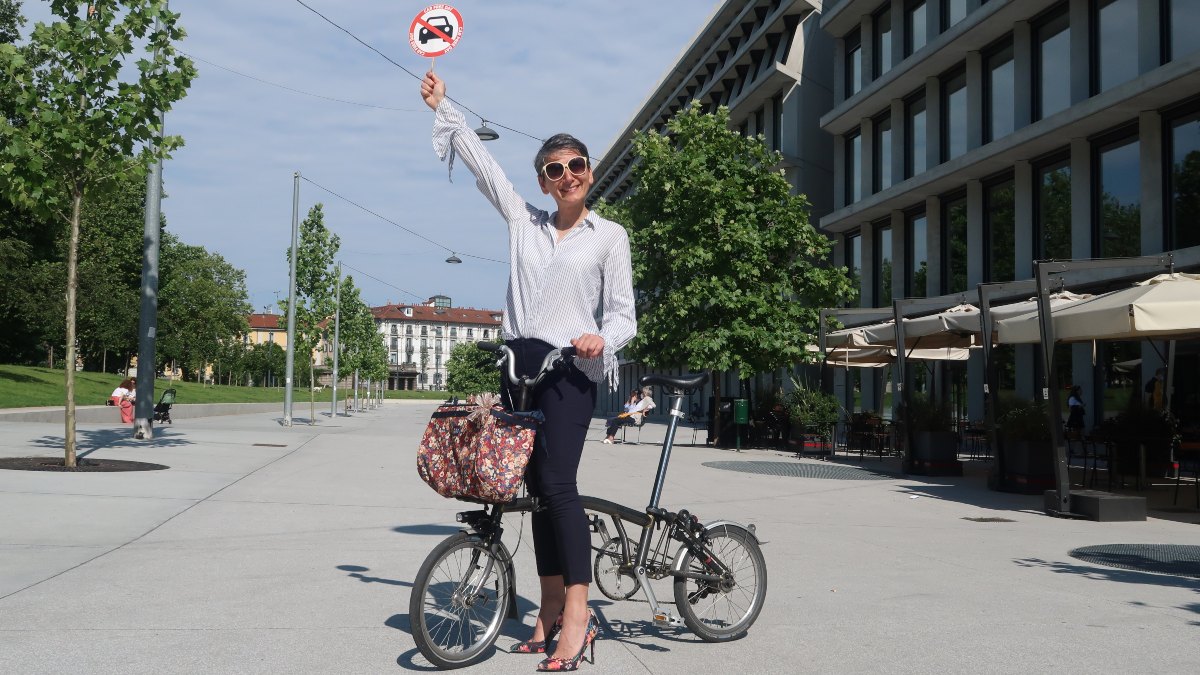
Celebrating International Women’s Day: Pinar Pinzuti the “cycling brainwasher”
ECF speaks to Pinar Pinzuti of Bikenomist about her experience within the world of cycling. A founding figure of the famous Fancy Women Bike Ride, she discusses how her love for cycling grew and what the future holds for women in cycling.
Pinar Pinzuti is a long-time cycling activist and guiding light in the European cycling advocacy scene. Born in Turkey, raised in Germany and now working hard in Italy, she is a full-time “cycling brainwasher” at Bikenomist, director of the Fiera del Cicloturismo – Cycle Tourism Expo&Talks, ambassador of the Women in Cycling Initiative and the coordinator of the international grassroots movement Fancy Women Bike Ride.
With experience as a photographer and cycling blogger, Pinzuti is a natural storyteller who is well aware that words and beautiful images are the best tools to reach and connect people around key advocacy battles. Besides her commitments as an advocate, she writes cycling holiday guides for various magazines, contributes to conferences as a speaker, shares her daily commutes by bike and organises events to demand more equitably shared public space and safer cycling in urban areas.
Over the past decade, Pinzuti has been working tirelessly to encourage more people to start cycling and to ensure other road users acknowledge and respect the bike as a fully-fledged part of the cityscape. Fortunately, she was able to put aside some time to speak to the European Cyclists’ Federation (ECF) about her experience within the cycling world and her plans for the upcoming summer, including a trip to Velo-city 2022 Ljubljana.
Q: What is it about cycling that you love so much?
I discovered the joy and freedom of cycling 15 years ago. Moving around by bicycle, for short and long distances, are the main source of happiness in my life.
The experience one finds when on a bicycle helps us to understand the value of slowness in a century where everything has to be fast or immediate and everybody has to rush all the time.
The bicycle offers an opportunity to take it all in and appreciate the little things you might otherwise miss due to its seamless connection to the outside world. To see these small things serves as a daily act of discovery. What we discover may be hidden beauty or ugliness in both urban areas and nature.
I started a blog to share my experiences and knowledge about the destinations I was exploring by bicycle and actively used social media to share what I was discovering on my daily bike commute. Despite there being many beautiful things, there were also several problems, such as dangerous intersections for pedestrians and cyclists, a lack of safe bicycle-parking infrastructure and limited intermodality (such as bicycles not being allowed on the metro or trains).
Instead of only pointing out the problem, I decided to find solutions and best practices from other cities and send these to my mayor. I used to write a letter to my mayor every Monday and visit the urban planning office of the city hall every Friday to see if my letter was taken into consideration.
Q: Have you seen the situation improve?
The situation has been improving, in many ways.
I am involved in various initiatives and I see an increase in the number of participants attending our free courses to learn how to ride a bicycle and joining bicycle mechanic workshops. There are more and more people becoming interested in cycling.
The mayors have more sensibility regarding cycling infrastructure and intermodal transportation. I have seen some concrete improvements in Izmir: bicycles can be transported in the metro without any time limitations and for free. World Car-free day is celebrated in Izmir, with certain roads being closed to motorised vehicles. There were more than 600 events organized during the European Mobility Week in Turkey.
Many Turkish cities have also started to implement station-based bicycle sharing schemes, while municipalities such as Istanbul, Izmir and Ankara have been sending urban planners to Velo-city Conferences since 2019.
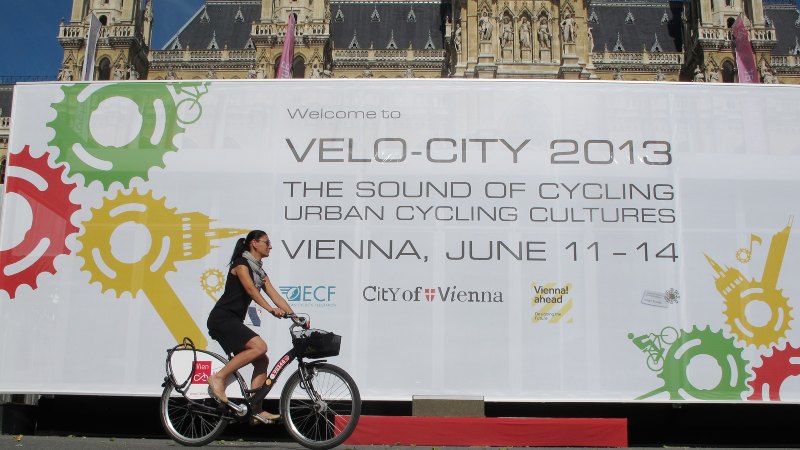
Image 1: Velo-city 2013 Vienna, the first edition Pinar attended.
Q: You’re somewhat of a repeat visitor to Velo-city, what's the story there?
I found out about the Velo-city conference series and decided to participate with the aim of learning from others and bringing these best practices to my city.
My attendance at Velo-city 2013 Vienna changed my social commitment as a citizen, and later also my professional career.
During the conference, the Mayor of Vienna, the Deputy Mayor, the Austrian Minister of the Environment, the Austrian Minister of Transport and the president of ECF were briefly in agreement that "The population of the world is increasing day by day. Cities have never been so crowded. The demand for transportation in urban areas continues to increase. Cycling is freedom and it is the means of transportation of the future in cities. It is an inevitable fact that infrastructure should be prepared for bicycle transportation and that city people should be encouraged to take up the bicycle as transportation”. Each speaker also highlighted the link between cycling and health expenditures.
Over the years, I have learned a lot from the key speakers and the wonderful variety of projects presented by activists from countless countries. At that first Velo-city I attended, I learned that in 2013, 4,000 people attended the Critical Mass cycling demonstration in Romania, up from only 1,000 cyclists that participated in 2012. So how did they achieve this? How were women aged 18-65 persuaded to move around by bike in Chile? Do cyclists spend more in local shops than car drivers? How did France make rental bikes a part of the city? How can we ensure that children love their bicycles? What kind of practices are there in New Zealand, which does not see the bicycle as a means of transportation? How did the municipality of Stockholm allocate €1.5 million for bicycle lanes?
Then, there was this man from Copenhagen who appeared on the stage. The charismatic Mikael Colville-Andersen, founder of Copenhagenize and Cycle Chic. He criticised cities who gave cars to the streets that belonged to people for 7,000 years and said that cycling in the city should be made as easy as walking.
I returned home with the idea of the car-free city, thinking about how to help ensure that this can become the reality.
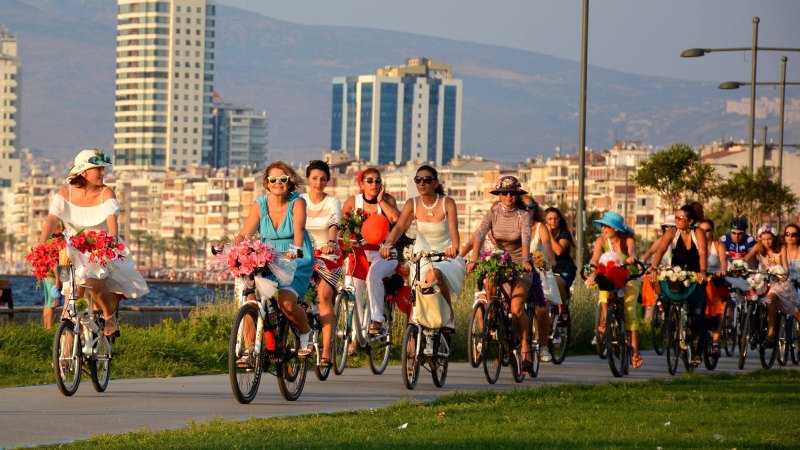
Image 2: Fancy Women Bike Ride, Izmir 2015
A better Turkey for women cyclists
I kept on writing a lot of articles for my blog on how to create car-free cities. Meanwhile, my neighbour, Sema Gur, learned how to ride a bicycle at the age of 40. She was surprised by the male-dominated cycling scene, with a lot of “rules” created by men: a cyclist must wear a helmet, wear proper technical clothes, ride fast and compete with each other. We both agreed that this approach would not help to convince more women to cycle, especially for commuting in the city.
On World Car-free day in September 2013, during European Mobility Week, we invited women to participate in the first women-only bike ride. Our event rules were completely the opposite of the common ones: ride slow, distance of the ride max 4 km, wave your hand and smile and wear something fancy!
The inaugural Fancy Women Bike Ride took place in Izmir, Turkey in 2013. The event had 300 women attending as well as almost 50 journalists. I guess they did not want to miss the “critical mass of the cycle chic.” We showed that cycling is not just about lycra, speed, and sweat, but also something that can bring joy, happiness and amusement. The next day, the photos and videos of the event were everywhere, in national and international media.
The next year, the event expanded to three cities, then ten. In 2019, there were 115 events in 15 countries. In 2021, there were more than 150 Fancy Rides in 24 countries.
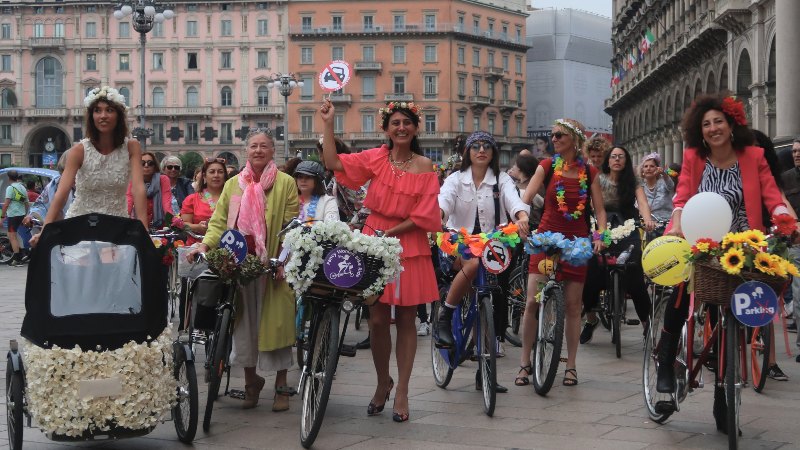
Image 3: Pinar and the women of the Fancy Bike Ride Milan 2019.
The event grew fast thanks to the sisterhood and solidarity among the women
In 2015, I had my first interview as a bicycle activist, and the title of the interview was “Bicycle activist hopes for a better Turkey for women cyclists.” In 2017, my story came full circle when I was invited to Velo-city 2017 Nijmegen to tell the story of the event and how it spread so quickly all over the world.
I was extremely excited during the presentation. A couple of months after the conference, a beautiful article appeared in the German newspaper, Zeit, with the title Fahrrad gleich Freiheit. I later found out that the journalist who wrote the article, Andrea Reidl, was among the audience during my presentation at Velo-city. Subsequently, I received a lot of applications to host Fancy Ride events in German cities.
In 2018, ECF’s tweet about the Fancy Women Bike Ride confirmed that the event was no longer a bike ride, but a social movement.
With the aim of learning more and sharing the knowledge I had gained myself, I participated in Velo-city 2019 Dublin. By that time, I had already left my career at a cloud technology company and started to work for Bikenomist, a communication and consultancy company based in Milan. I was writing articles in Italian for Bikeitalia magazine, as well as in English, German and Turkish for many newspapers and magazines. Of course, they were all about cycling, cycle holidays, cycle commuting and bikenomics.
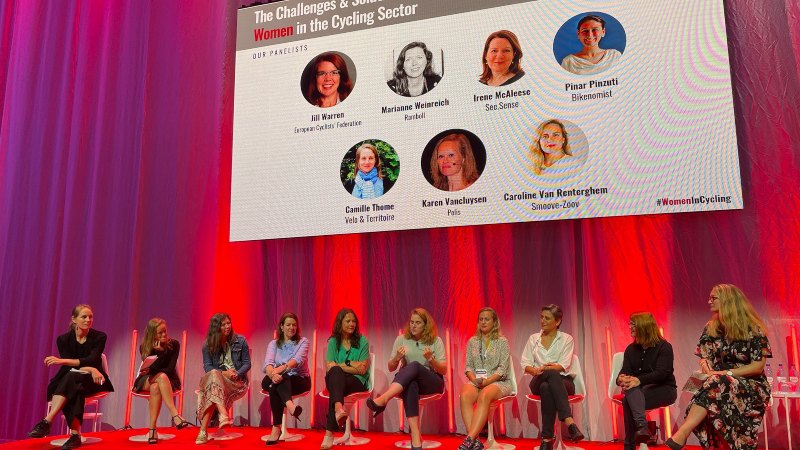
Image 4: Women in Cycling initiative, including Pinar, on stage at Velo-city 2021 Lisboa.
Women In Cycling Initiative
Working in a super male-dominated industry (yes, the bicycle industry is male-dominated), I often find myself as the only woman participating in meetings, events or conferences. Consequently, I kept asking myself if the products and services are designed, produced and communicated by male professionals, how on earth could we expect to have more female bicycle users?
As it turns out, I was not the only one looking for an answer to this question.
At the beginning of 2021, the Women in Cycling Initiative was launched by Cycling Industries Europe and I became one of the ambassadors of the project. I loved the idea of giving visibility to the female professionals working in our industry so that we might inspire and convince more women to work alongside us.
Velo-city 2021 Lisboa
Finally, after two years of virtual meetings and conferences, I was happy to be back in Lisbon for Velo-city. We could not embrace each other, but at least I could chat and toast in the evenings with like-minded people. I was back on stage with my story about “Women reclaiming public space.” Fancy Women Bike Ride has been recognised as a best practice for getting more women on bikes, and I was the lucky person to share our experience with the rest of the world.
This year on September 18th, I will be coordinating the 10th edition of Fancy Women Bike Ride in almost 200 cities across the globe.
But before that, I will be realizing my dream on 12-13 March in Milan. Since my first bicycle tour, I have always dreamed of an event to inspire more people to take cycling holidays. Finally, after two years of hard work, I am presenting Italy’s first (Europe’s second) Cycle Tourism Fair, “Fiera del Cicloturismo,” with 52 destinations (national and international), tour operators and services to the public, cyclists and non-cyclists.
I hope this fair with its EXPO partners and inspiring presentations, will help more people to consider active and sustainable vacations.
Q: What about Velo-city this year?
I am looking forward to participating in Velo-city 2022 Ljubljana. I've been involved in many cycle tourism projects in the last couple of years and one of them has proved itself to be one of the best practices to get inspired from. I am happy to be back on stage to present the regional cycle network “Ciclovia Parchi Calabria,” which is a new way to define the future resilience of tourism creating a balance between the needs of people, the planet and prosperity.
Download the Velo-city 2022 Ljubjlana programme here.
Hurry up! Don’t miss the early bird tickets available until 14 March 2022.
News category:
Contact the author
Recent news!
Upcoming events
Contact Us
Avenue des Arts, 7-8
Postal address: Rue de la Charité, 22
1210 Brussels, Belgium









